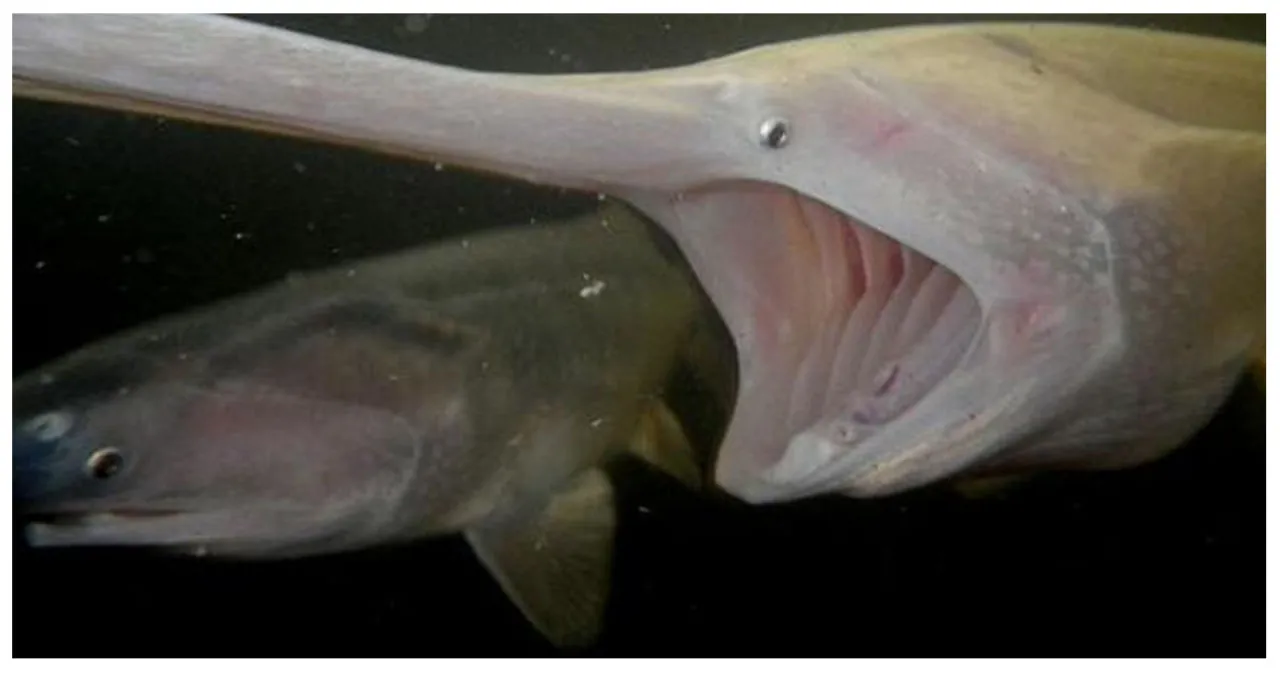Do Not Keep This Strange-Looking Fish If Caught in Alabama, Release It Immediately!
It’s neither a gar nor a shovelnose sturgeon. While some may mistake it for a catfish or a freshwater shark, it is actually quite distinct. This species is incredibly old, with fossils dating back millions of years. If you happen to catch one, it’s easy to identify. However, if you happen to catch this fish in Alabama, it’s crucial to release it back into the water immediately. Let me explain why…
The American Paddlefish, also known as the spoonbill, spoonbill catfish, or Mississippi paddlefish, gets its name from the unique feature on its head – a long, paddle-like appendage or bill. In the photo above, you can see a juvenile paddlefish. Once abundant in Alabama, this peculiar-looking fish faced a decline in population due to commercial harvesting and habitat loss, pushing it perilously close to extinction. Although not poisonous or dangerous, the Alabama Department of Conservation and Wildlife has strict protections in place for this species. It is against the law to keep or catch them, and you must release them back into the water.
The American paddlefish, often referred to as a spoonbill catfish, is not actually a catfish or a bottom feeder. Despite its resemblance to a shark with its dorsal fin, tail fin, and smooth scale-less skin, it belongs to the ray-fin fish category. This unique species is the last surviving member of the cartilaginous family, as its skeletal structure is composed entirely of cartilage instead of bones. Interestingly, the freshwater sturgeon is the paddlefish’s closest living relative.
The paddlefish population experienced a rapid decline due to the excessive exploitation of their eggs for caviar production. For many years, caviar made from the eggs of the Russian Beluga sturgeon was renowned as the finest in the world. However, the uncontrolled harvesting of sturgeon in Russia nearly wiped out the species by the 1970s. When it was discovered that the eggs of the American paddlefish were similar to those of the Beluga sturgeon, the demand for paddlefish eggs skyrocketed.
Conservationists often came across dumping grounds filled with the bodies of numerous female paddlefish. These fish were caught in nets and on trotlines, only to be slaughtered for their eggs. Consequently, the American Paddlefish population was on the brink of extinction by the late 1980s. Even in recent times, poachers have been apprehended for illegally harvesting paddlefish to cater to the black market.
Paddlefish have a unique feeding mechanism where they swim through the water with their mouths wide open, using filaments in their gills as filters to capture plankton. These fish possess bills that can reach up to a third of their total length, which can be quite substantial. They can grow up to 7 feet long, weigh up to 200 pounds, and live for approximately 30 years.
Before being added to the protected species list, an impressive paddlefish record was set in Alabama in 1982. Susan Hollace of Muscle Shoals caught a paddlefish weighing 52 lbs. 12 oz. in Wilson Lake. Similarly, Tennessee holds the record for a paddlefish caught last year at Cherokee Lake, weighing 120 pounds and measuring 6.3 feet long. While several states, including Tennessee and Oklahoma, permit limited paddlefish fishing during a short season, it is crucial to ensure responsible harvesting practices to protect the species.
In an intriguing photo below, country music artist Blake Shelton can be seen proudly displaying his paddlefish catch in Oklahoma.
The Alabama Department of Conservation and Wildlife claims on their website that American paddlefish are only found in specific coastal areas. However, I beg to differ. Recent reports suggest that American paddlefish have been caught in Wilson Lake as recently as 2017 or later. This indicates that the species might be making a slow recovery. Conservationists are optimistic that the American paddlefish will once again become abundant in Alabama.
Read More: Did you see the Mississippi hunter who bagged a freakish 29-point buck?







